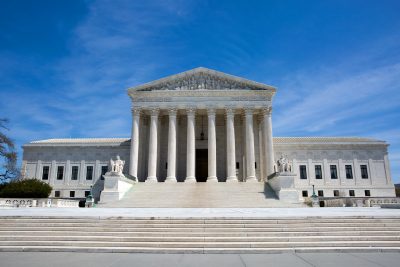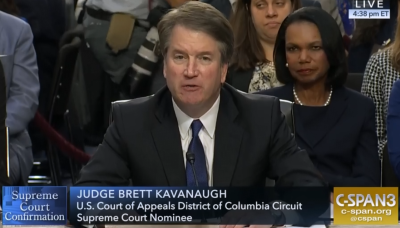Due Process and the Courts
What does the constitution say about due process?
The Fifth Amendment to the Constitution says clearly that no person shall be deprived of life, liberty, or property without the due process of law. Note that this says person, not citizen, and over the years the Supreme Court has consistently ruled that the Due Process Clause applies to all people in the United States.Do non-citizens have the right to due process in the U.S.?
Yes. The Constitution guarantees due process rights to all "persons," not just citizens. This means non-citizens, including undocumented immigrants, are entitled to fair treatment under the law. This includes the right to defend themselves in court. But recent Trump administration policies that speed up deportations and limit access to legal representation make it harder for non-citizens to get their fair day in court.- Access to legal representation Access to legal counsel is an essential part of our justice system and our democracy. In the criminal justice system, anyone facing even one day in jail gets a lawyer if they can't afford one. But immigrants facing deportation usually don't get that chance.The research is clear – the most effective way to ensure some level of due process for people navigating our complicated immigration system is for them to have trained attorney at their side. But Trump administration is now working to strip attorneys from as many people as possible, all in the name of increasing its deportation numbers. This attempt to eliminate basic due process will hurt people who already have few options.
- Fair day in court Due process guarantees that individuals have the opportunity to defend themselves in court. This includes non-citizens facing deportation.
Why is due process important?
We are seeing right now the importance of due process when it comes to President Trump's actions to carry out the so-called Alien Enemies Act, a 1798 wartime law that permits people to be deported outside of the normal framework of immigration law. President Trump has alleged that this law allows him to simply point at any person, declare them to be an alien enemy, and kick them out of the country without ever having a chance to see a judge. Thankfully, the Supreme Court said that is not true, and in a unanimous decision, ruled that people can challenge the Trump administration's invocation of the Alien Enemies Act. That is why due process is so important, because it means that no person can be rounded up and sent to another country without a chance to go to court and make the government prove their case.How is the American Immigration Council working to protect due process?
- We serve thousands of individuals in immigration detention centers through the Immigration Justice Campaign, our initiative with the American Immigration Lawyers Association. The Justice Campaign provides free legal services for immigrants who would otherwise have to navigate our complicated immigration system without a lawyer.
- We use the courts to demand a fair process for immigrants. Our litigation team is fighting back against the Trump administration’s blatant disregard for due process including filing a lawsuit challenging their illegal detention of immigrants in El Salvador’s notorious Terrorism Confinement Center (CECOT).

Disarray in Baltimore Immigration Court Is Emblematic of Systemic Issues
Overwhelmed immigration courts and massive court backlogs have long been a nation-wide problem. Hearings are regularly scheduled years in advance—in some jurisdictions, judges are scheduling hearings into 2022. This means that many immigrants are held in limbo for years, unable to move forward, while living with the uncertainty… Read More

As Immigration Court Quotas Go Into Effect, Many Call For Reform
On October 1, immigration judges around the country will arrive at work and face a daunting new task; complete 700 removal cases in the next year or risk official sanction. The new court quotas and performance metrics were imposed as part of Attorney General Jeff Sessions’ ongoing push to reduce… Read More

Which Immigration Cases Will the Supreme Court Hear This Term?
On October 1, the Supreme Court will begin hearing cases for the start of its 2018-2019 term. Although only one immigration case is currently scheduled to be heard, challenges to President Trump’s immigration policies will likely end up in front of the Court by the end of the term. As… Read More

Sessions Limits Immigration Judges’ Ability to Dismiss Deportation Cases
In his latest attempt to micromanage immigration judges and ensure a maximum number of deportations, Attorney General Jeff Sessions issued a decision last week restricting a judge’s ability to terminate cases. He made this decision despite the fact that these cases may be unnecessary to pursue and helpful to… Read More

Matter of L-A-B-R-
This amicus brief discusses how Sessions’ public statements indicate prejudgment about the use of continuances and explains how Sessions’ use of the referral authority suggests that he is choosing to refer cases to himself to achieve predetermined political and policymaking goals. Read More

Immigrant Rights Groups Demand Timely Bond Hearings and Legal Protections for Asylum Seekers
Yesterday, plaintiffs in an ongoing lawsuit challenging the U.S. government’s targeted efforts to obstruct asylum seekers filed a motion for preliminary injunction demanding timely bond hearings that comport with due process. Read More

In a Speech to New Immigration Judges, Attorney General Sessions Attacks Immigration Lawyers and Judicial Independence
Rather than encourage the new class of 44 immigration judges to be fair and impartial adjudicators in his Monday morning speech, Attorney General Jeff Sessions advocated for a deeply flawed immigration court system and directed judges to carry out the Trump administration’s punitive, anti-immigration agenda. While many would have… Read More

Motions for a Continuance
This Practice Advisory provides a practitioner-focused overview of motions to continue a case in removal proceedings, from the basics of making the motion to advanced issues of jurisdictional bars to appellate review of continuances. Read More

New Government Study Attempts to Undermine Legal Orientation Program for Detained Immigrants
The Department of Justice (DOJ) released “Phase I” of its review of the federally-funded Legal Orientation Program (LOP) this week. The review came after Attorney General Jeff Sessions attempted to end the program in April but was forced to reverse that decision after receiving significant bipartisan pushback from Congress. Read More

Brett Kavanaugh’s Record on Immigration Raises Questions
President Trump’s nominee to replace Justice Anthony Kennedy on the Supreme Court—D.C. Circuit Judge Brett Kavanaugh—appears in front of the Senate Judiciary Committee this week to answer questions about his judicial record and temperament. During multiple days of hearings, senators are expected to ask him about his position on everything… Read More
Make a contribution
Make a direct impact on the lives of immigrants.
